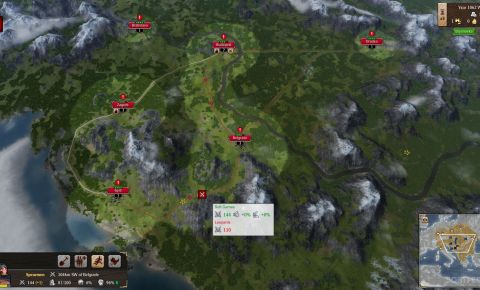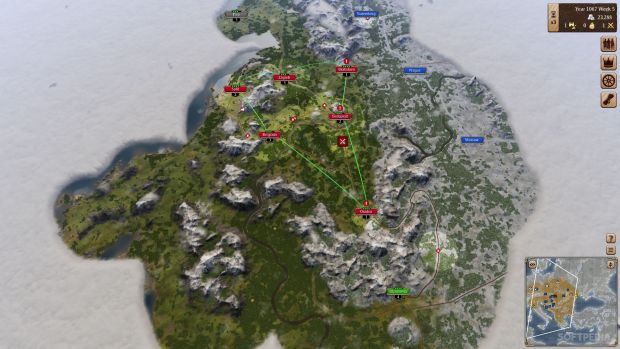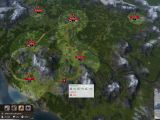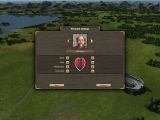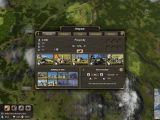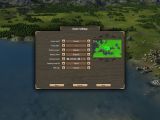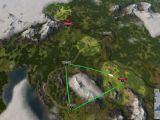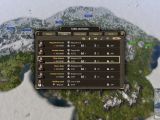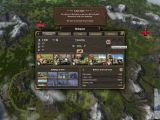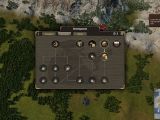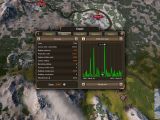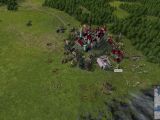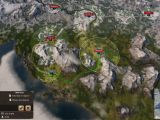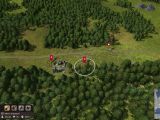Grand Ages: Medieval is a game about the power of trade and about how, given enough time and resources, a dedicated ruler of a virtual faction can basically gobble up the entire world if he makes good deals and uses his armies only when it's necessary.
The title created by the developers at Gaming Minds is at its core an economic simulator centered on the Middle Ages, that also features some combat and exploration but never loses focus of the fact that business, traders, and negotiation are crucial for long-term success.
Grand Ages: Medieval offers both a classic guided campaign, which features a family of noblemen from the Byzantine Empire around the year 1050, and a more classic open sandbox.
The first is interesting because it introduces each concept of the game gradually and explains how they all fit together, and because it offers a narrative with some interesting twists and turns, but it's easy for players to simply jump into an open campaign and learn everything from the limited tutorial and by consulting the in-game help from time to time.
When starting a game, players will be presented with a map of Europe, which allows them to choose how much of the continent is competitive and where they want to start their adventure, and they will then be put in charge of one town, one merchant, and one scout.
Even if the map of Europe is pretty accurate, Grand Ages: Medieval is only loosely based on real world history, because it abstracts much of the political and social realities and trends of the era so that it can focus on the power of trade.
Players will need to explore the map to discover both neutral towns and the major trading empires that oppose them, while deciding on how to best use their trader and associated caravans.
Traders can be individually managed with their entire cargo, but it's much more efficient to create routes that include cities, based on the commodities each produces and uses, and to then let them run around freely, producing money and allowing urban centers to develop.
Neutral towns can be converted to the gamer's faction in time, given enough exchange of resources and some solid bribing work, and gamers also have the option to use settlers to create entirely new settlements, mostly to get access to resources they lack.
Grand Ages: Medieval also gives gamers a tech tree to progress through, which opens up new options for the various units and buildings that can increase prosperity.
As the money flows and the towns develop, the big factions will inevitably come into conflict with one another, but armies never become the most important force projection tool in the game.
Gaming Minds is determined to show the power of money and that means it is often easier to buy sympathy and take over a city after a massive transfer of gold rather than laying siege to it with troops for a long period of time.
“Grand Ages: Medieval is finely balanced and challenging as long as gamers accept the fact that its version of history makes trading and gold the center of the world, ignoring almost any other meaningful human activity.”
The positive aspect of this approach is that it creates a game that's very different from other strategy titles on the market, while the downside is that the gameplay can feel a little limited and lacking in excitement.
Grand Ages: Medieval is not a graphics powerhouse and often looks worse than the leader in the strategy field in this category, the Total War series, but it's clear that those who are drawn to the title are not too focused on the textures of the buildings or the way the light of the sun is deflected.
Most of the time, gamers will stay as zoomed out as possible in order to see all their cities and those of their rivals and make plans about how they can tweak their network of traders or how they can move their armies.
The interface of the game is well-designed and offers all the information players need in order to make decisions, and there's plenty of extra data to explore for those willing to dig through an extra layer of screens.
Players can also engage in multiplayer if they feel like competing with other humans, with the same core mechanics and with a range of extra choices when it comes to victory conditions and the setup of the campaign.
It's very nice to see that the developers have included the concept of running the competition for a period of time, as little as 45 minutes, with the winner being the player who performs best during that period, which creates a cool pressure to move fast and secure deals to make money fast.
The Good
- Focus on economics
- Alternate take on traditional strategy
- Open ended campaign
The Bad
- Limited story appeal
- Limited connection to historical events
Conclusion
The development team has created some solid, if sometimes dry, mechanics that will challenge players to balance their budget, keep acquiring cities and deal with the wealth of challenges a sprawling trade empire can create.
I liked my time with Grand Age: Medieval, but after spending a lot of time in the Balkans in my first campaign, I want to see whether there's variety in switching to another region for the start town.
 14 DAY TRIAL //
14 DAY TRIAL // 